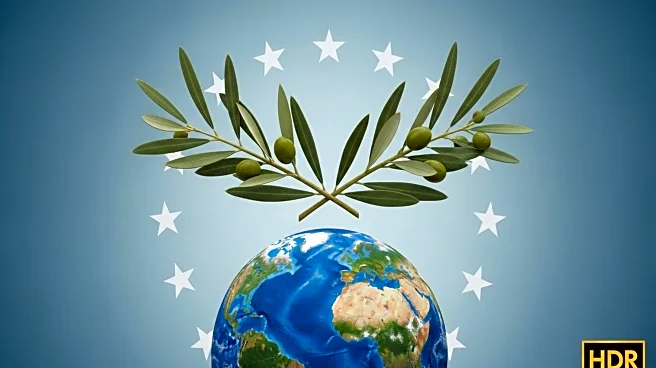What's Happening?
The European Commission has proposed suspending parts of the EU-Israel trade agreement and imposing sanctions on Israeli far-right ministers and some West Bank settlers, as well as Hamas leadership. This decision comes in response to what the Commission describes as 'horrific events taking place in Gaza on a daily basis.' European Commission President Ursula von der Leyen emphasized the need for these measures, citing breaches of human rights and democratic principles by the Israeli government. The EU's chief diplomat, Kaja Kallas, stated that the EU must use available tools to pressure Israel into changing its course of action.
Why It's Important?
The proposed sanctions by the EU could have significant implications for Israel's economy and its political relations with European countries. By targeting trade benefits and specific political figures, the EU aims to exert pressure on Israel to alter its policies in Gaza and the West Bank. This move could lead to increased diplomatic tensions between Israel and the EU, potentially affecting trade and political cooperation. The sanctions also highlight the EU's stance on human rights and its willingness to take action against perceived violations, which could influence international discourse on the Israeli-Palestinian conflict.
What's Next?
If the sanctions are implemented, Israel may face economic repercussions and increased diplomatic isolation from European countries. The Israeli government could respond by seeking alternative trade partners or by attempting to negotiate with the EU to mitigate the impact of the sanctions. Additionally, the situation in Gaza and the West Bank may continue to be a focal point of international attention, potentially leading to further actions by other global entities. The EU's decision could also prompt reactions from other countries, either in support or opposition to the proposed measures.
Beyond the Headlines
The EU's proposal to sanction Israel underscores the complex geopolitical dynamics surrounding the Israeli-Palestinian conflict. It raises questions about the effectiveness of international sanctions in influencing state behavior and the ethical considerations involved in such decisions. The move also reflects broader debates on human rights and the role of international organizations in addressing conflicts. Long-term, this development could contribute to shifts in international alliances and affect the EU's role as a mediator in Middle Eastern affairs.








